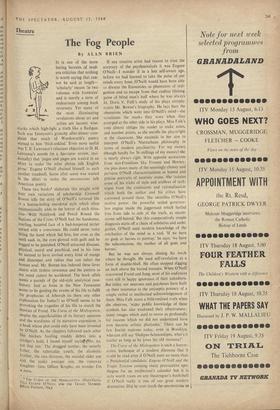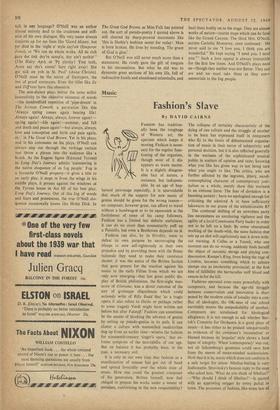Theatre
The Fog People
By ALAN BRIEN IT is one of the more boring heresies of mod- ern criticism that nothing is worth saying that can- not be said at length— 'scholarly' means 'in two volumes with footnotes' and is merely a term of endearment among book 3 A reviewers. Yet many, of the most illuminating revelations about art and artists are laconic wise- cracks which high-light a truth like a flashgun. Such was Tennyson's grouchy after-dinner com- plaint that much of Wordsworth's poetry seemed to him `thick-ankled.' Even more useful Was T. E. Lawrence's reluctant objection to D. H. Lawrence's novels (in a Spectator review, inci- dentally) that 'pages and pages are wasted in an effort to make the solar plexus talk 'English Prose.' Eugene O'Neill chained himself to such another treadmill. Scene after scene was wasted in the effort to make the unconscious talk American poetry.
These two books* elaborate this insight with their own variations of scholarship. Croswell Bowen tells the story 'of O'Neill's tortured life in a button-holing anecdotal style which often unintentionally adds to the horror of each situa- tion—With Notebook and Pencil Round the Stations of the Cross. O'Neill had the handsome, snarling, haunted face of a bad-tempered terrier cursed with a conscience. He could never resist biting the hand which fed him, but even as the teeth sank in, the eyes glowed with guilt and he begged to be punished. O'Neill attracted diseases, Physical, moral and psychical, and in his time he seemed to have invited every kind of mange and distemper and rabies that can infect the human soul. Mr. Bowen has indexed these fever charts with tireless reverence and the pattern to my mind cannot be accidental. The book often seems a parody of tile old-style analytical case- history. Just as Jesus in the New Testament seems to be guiding the, events of his life to fulfil the prophecies of Jehovah (is there any other explanation for Judas?) so O'Neill seems to be Provoking the tragedies of his life to match the theories of Freud. The Curse of the Misbegotten, despite the superficialities of its literary opinions and the wordiness of its narrative exposition, is a book whose plot could only have been invented by O'Neill. As the chapters followed each other like buckets hauling muddy debris into a dredger's hold, I found myself sayinfitNo, no, not that too.' The drugged mother, the miserly father, the tubercular youth, the alcoholic brother, the two divorces, the suicidal elder son and the junky younger son, the runaway daughter - -Gee, Officer Krupke, no wonder I'm a mess.
* THE CURSE OF THE MISBEGOTTEN. (Hart-Davis. 258.) EUGENE O'NEILL AND THE TRAGIC • TENSION. (Mark Pattison, 36s.) If any creative artist had reason to trust the accuracy of the psychoanalysis it was Eugene O'Neill—I wonder if in a less self-aware age, before we had learned to take the pulse of our minds every hour, O'Neill would have been able to dismiss the Eumenides as phantasms of indi- gestion and so escape from that endless lifelong game of blind man's buff where he was always Id. Doris V. Falk's study of his plays comple- ments Mr. Bowen's biography. He lays bare the obsessions which went into O'Neill's mind—she scrutinises the masks they wore when they emerged at the other side in his plays. Miss Falk's tone almost obliges the reader to make notes, and number points, as she unrolls the playwright in the classroom. She succeeds in her aim to interpret O'Neill's Nietzscheam philosophy in terms of modern psychiatrity. For my money (though hardly for 36 shillings of my money) she is nearly always right. With apposite quotations from neo-Freudians like Fromm and Homey, she pins down many of the seemingly clumsy and perverse O'Neill characterisations as honest and precise portraits of neurotic states. She isolates some of his tricks of style and artifices of tech- nique from the confusions and rationalisation which both the author and his critics have cocooned around them. She identifies O'Neill's motive power, the powerful sealed governor- less engine inside the juggernaut which hurled him from side to .side of the track, as uncon- scious self-hatred.' But this comparatively simple diagnosis starts of a chain of subtleties and ambi- guities. O'Neill used modern knowledge of the mechanics of the mind as a tool. 'If we have no gods or heroes to portray,' he says, 'we have the subconscious, the mother of all gods and heroes.'
But he was not always shining his torch where he thought. He used self-revelation as a form of double-bluff. He often stopped digging an inch above the buried treasure. When O'Neill' discovered Freud and Jung, most of his audiences were still in happy ignorance of their nakedness. But today our neuroses and psychoses have built up their resistance to the antiseptic potency of a simple verbal or intellectual acknowledgement of them. Miss Falk states a little-realised truth when she observes, 'wider public knowledge of these symbols has also weakened their effectiveness: many images which used to move us profoundly for reasons which we did not understand have now become artistic platitudes.' There can be few Jewish matrons today, even in Brooklyn, who can still say 'Oedipus-Schmoedipus, what's it matter as long as he loves his old momma?'
7'he Curse of the Misbegotten is such a horror- comic burlesque of a modern dilemma that it could be read even if O'Neill were no more than a Presidential candidate. Eugene O'Neill and the Tragic Tension containss many provocative apo- thegms for an intellectual's calendar but it is only worth room on any theatregoer's bookshelf if O'Neill really is One of our great modern dramatists. Did he ever teach the unconscious to talk in any language? O'Neill was an author almost entirely deaf to the crudeness and stiff- ness of his own dialogue. His very name always conjures up for me lines like `Gawd blimey, but yer died in the 'eight o' style any'ow (Emperor Jones), or 'We run de whole woiks. All de rich guys dat tink dey're sump'n, dey ain't nothin" (The Hairy Ape), or Ty yiminyl Yust tank, Anna say she's comin' here right avay 1 She gat sick on yob in St. Paul' (Anna Christie). O'Neill must be the terror of linotypers, the test of proof correctors. Even the titles like He and Dig' rent have this obsession.
The non-dialect plays betray the same wilful insensitivity to the objective existence of words —the hundredfold repetition of 'pipe-dream' in The Iceman Cometh, a peroration like this `Always spring comes again bearing life! Always again ! Always, always, forever again !— spcing again !—life again ! —summer, and fall and death and peace again ! —but always, always, love and conception and birth and pain again, etc.' in The Great God Brown. Yet in his plays, and in his comments on his plays. O'Neill can always step out through the verbiage curtain and throw a phrase into the audience like a bomb. As the Eugene figure (Edmund Tyrone) in Long Day's Journey admits 'stammering is the native eloquence of us fog people.' Fog is a favourite O'Neill property—it gives a title to an early play, it seeps in from the wings in his middle plays, it presses against the windows of the Tyrone house in Act III of his best play, Long Day's Journey. Out of this fog of words and fears and pretensions, the true O'Neill elo- quence occasionally looms like Moby Dick. In The Great God Brown, as Miss Falk has pointed out, the sort of pseudo-poetry I quoted above is still cleaved by sharp-prowed statements like `this is Daddy's bedtime secret for today : Man is born broken. He lives by mending. The grace of God is glue.'
But O'Neill was still never much more than a stammerer. He rarely gave the gift of tongues to his unconscious. But what he did was to dynamite great sections of his own life, full of radioactive fossils and abandoned mineshafts, and
haul them bodily on to the stage. They are almost works of nature—tourist traps which can be fatal like the Grand Canyon. The third Mrs. O'Neill, actress Carlotta Monterey, once confessed : 'He never said to me "I love you, I think you are wonderful." He kept saying "I need you. I need you."' Such a love appeal is always irresistible for the first few times. And O'Neill's plays need us—though they neither woo nor flatter. They just are and we must take them as they are— memorials to the fog people.



































 Previous page
Previous page